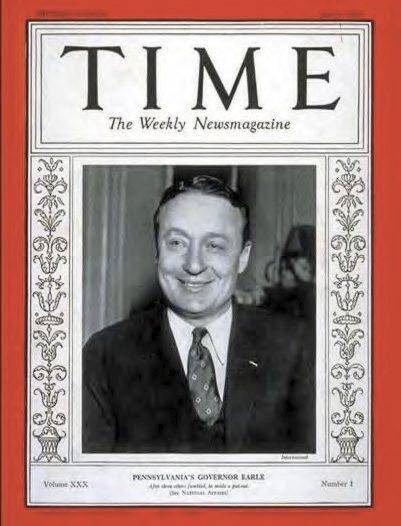https://naviga.triblive.com/opinion/paul-kengor-pa-s-forgotten-and-canceled-governor/
Paul Kengor: Pa.’s forgotten and canceled governor

Gov. George Earle. Have you heard of him?
Born in Devon, Pa., Earle was governor of Pennsylvania from 1935 to 1939, one of only two Democrats to be elected to that spot between the Civil War and World War II, and a respected and popular politician, featured on the cover of Time magazine in 1937. He could have been president, if not for FDR — in more than one way.
Earle is the subject of a just-released book by Christopher J. Farrell, “Exiled Emissary: George H. Earle III, Soldier, Sailor, Diplomat, Governor, Spy.” Earle was “very much the leading candidate for the Dem presidential nomination,” Farrell told me in an interview about his book. “Earle definitely could have been president. No doubt. He hosted the ’36 Democratic National Convention in Philadelphia and was a huge donor to the party and FDR. Earle’s ‘heir apparent’ status to FDR was openly and often discussed.”
But standing in the way was FDR.
FDR broke precedent (started by George Washington) and pursued a third term, in part insisting that the winds of war (and the Great Depression) justified him staying in the White House during such a precarious time. It was those winds of war that Earle had warned FDR about. In fact, he would warn FDR first about the Nazi threat and then about the Soviet threat, the latter of which FDR never fully comprehended, to the great chagrin of Earle, not to mention the people of Eastern Europe and a coming Cold War.
Earle’s experience in that regard was utterly unique, if not tragic.
FDR had failed to heed the prophetic warnings of Earle regarding Soviet aggression throughout Eastern Europe during World War II, including Earle’s wholly accurate conclusion that the Soviets were behind the 1940 Katyn forest massacre of nearly 22,000 Polish military officers. FDR had naively accepted Stalin’s claim that the Nazis had committed the crime. Earle, who had been dispatched by FDR as a special emissary to investigate the incident, correctly concluded just the opposite. Not only did FDR refuse to believe Earle but ordered Earle not to publicly talk about what he had found, judging that Earle’s conclusion would harm the U.S. wartime alliance with Stalin’s USSR. It would indeed, but the truth was the truth. And FDR refused to believe it, ordering Earle’s silence instead.
Actually, FDR’s behavior was worse than that. What he did to Earle was shocking.
In an almost unbelievable response, Earle was effectively exiled by the president over this matter. Yes, exiled. Earle had asked FDR for permission to go public with his concerns about Katyn. Here was how FDR responded on March 24, 1945, in writing:
“I specifically forbid you to publish any information or opinion about any ally that you may have acquired while in office or in the service of the United States Navy. In view of your wish for continued active service, I shall withdraw any previous understanding that you are serving as an emissary of mine and I shall direct the Navy Department to continue your employment wherever they can make use of your services.”
Where might they make use of Earle’s “services”? If the stern message was not clear enough, it was followed by a gesture far more disconcerting. According to George Earle himself, shortly after he received this letter from FDR, he was greeted by two FBI agents while fishing at a remote lake in Maryland. The agents delivered a letter announcing the former governor’s immediate assignment to the island of Samoa, 7,000 miles away, where he had been appointed assistant head of the Samoan Defense Group. The president himself had made the assignment though the U.S. Navy.
This, it turns out, was the area of “employment wherever they can make use of your services” that FDR had in mind.
For the record, Katyn is just one of several disturbing examples given by George Earle and related by Chris Farrell regarding FDR and World War II. Farrell offers a July 1958 assessment from Earle that is devastating: “Millions of American men and women would gladly have given their lives if it meant ending World War II a day sooner than it did. I believe one man had a chance to shorten the conflict by more than 18 months — and brushed it off. His name? President Franklin D. Roosevelt.”
Quite an assessment from the one Democratic politician who could have been elected to succeed FDR in 1940. Or later. But by then, Earle was gone, exiled by the iconic New Dealer.
In Farrell’s description, Earle was “canceled” by FDR. He indeed was. And George Earle deserved better. He also deserves to be better remembered by Pennsylvanians. Chris Farrell’s book is a good place to start.
Copyright ©2026— Trib Total Media, LLC (TribLIVE.com)
